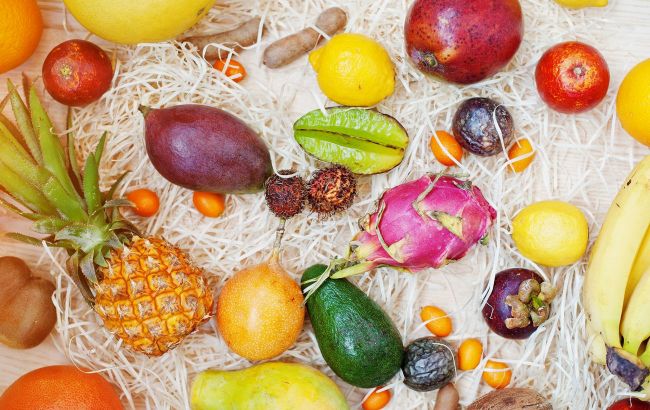Top healthiest fruits with anti-inflammatory properties
 Named fruits reducing inflamation (photo: Freepik)
Named fruits reducing inflamation (photo: Freepik)
Fruits possess anti-inflammatory properties as they contain numerous antioxidants and fiber. While they cannot replace medical treatments, they can significantly alleviate some conditions, writes Real Simple.
The ways fruits reduce inflammation
There are two different types of inflammation that may occur in your body.
"The first type, called acute inflammation, is the short-term pink or red or swelling around a wound that happens while the wound is healing,” says dietitian Janice Chow.
This type of inflammation is beneficial for your body, as it is a natural response of your system to an unwanted intrusion (injury, illness, infection, etc.).
Chronic inflammation is the second type of inflammation, and if left untreated, it can cause even more harm to your health. It is called "chronic" because it does not subside and lasts for a more extended period.
"Chronic inflammation could be triggered by various factors, like external and internal traumas. It might be diseases or conditions that a person might have, or a prolonged environmental impact [that they’ve experienced]," adds Chow.
Examples of environmental triggers include psychological stress, air pollution, and poor nutrition. Chronic inflammation resulting from these triggers can create an environment conducive to the onset of diseases.
According to Chow, many types of fruits have strong anti-inflammatory properties because they contain nutrients and compounds that help reduce this chronic inflammation, paying special attention to two main groups of compounds found in food: antioxidants and fiber.
"The role of antioxidants is to neutralize some of the unstable molecules in our body that might happen during inflammation," explains Chow.
Unstable molecules, called free radicals, are produced when your body is constantly exposed to environmental factors such as air toxins, alcohol consumption, stress, poor nutrition, and more.
"An excessive amount of these unstable molecules may cause longer-term damage to our cells, and there are theories that this kind of cellular damage may lead to chronic diseases," adds the expert.
Increased consumption of antioxidants from food (mostly plant-based) can help neutralize these unstable molecules.
Research also points to fiber as another of the most beneficial compounds for reducing chronic inflammation. One way in which fiber can achieve this is by maintaining the pH level of the intestines, which reduces the number of inflammatory molecules.
Top anti-Inflammatory fruits
Apples
They can almost always be found in the nearest grocery store, so it's worth not forgetting about them when making a shopping list. Apples are excellent sources of antioxidants, namely vitamin C, quercetin, and flavonoids, and some varieties are rich in fiber, especially in the skin.
Berries
Research indicates that consuming berries is associated with a lower risk of diseases. According to Chow, berries are rich in fiber and antioxidants, such as vitamin C.
For example, half a cup of strawberries provides you with 50% of the recommended daily intake of vitamin C. Berries also contain a lot of quercetin, carotenoids, and anthocyanins.
Anthocyanins are plant pigments that give cranberries, strawberries, blueberries, raspberries, and blackberries their beautiful red, purple, and blue colors.
Stone fruits
According to Chow, peaches, plums, and cherries are rich in antioxidants such as vitamin C, vitamin A, anthocyanins, and phenolic acid. They also provide you with a good amount of fiber.
Red and black grapes
"Red and black grapes are well known for an antioxidant called resveratrol, which is found in their skin. The skin also contains a lot of fiber, so I would highly suggest consuming grapes with their skin on," recommends the expert.
This darker grape variety is also rich in other antioxidants such as vitamin C, vitamin B2, anthocyanins, quercetin, and flavonoids.
Citrus fruits
All citrus fruits, including oranges, grapefruits, lemons, and limes, are rich in antioxidants such as flavonoids and vitamin C. Half a cup of grapefruit provides 40% of the recommended daily intake of vitamin C. They also contain a lot of fiber.
"One word of caution with grapefruit is that some medications could potentially react with it, so I would consult with your doctor before eating it," says the dietitian.
Pomegranate seeds
When you eat the juicy, crunchy ruby-red seeds of a pomegranate, you benefit from both fiber and antioxidants like vitamin C, anthocyanins, tannins, and phenolic acid. These nutrients are extremely beneficial and are a tasty addition to both sweet and savory dishes.
Pineapple
Pineapple contains a compound called bromelain, which has anti-inflammatory properties. Pineapple is also a good source of fiber and antioxidants such as vitamin C and vitamin A.
Watermelon
Watermelon is known for its vibrant red color, which is attributed to another powerful antioxidant called lycopene. It is also an excellent source of vitamin C.
Previously, we wrote about the best products with healing properties which are recommended for those who want to become healthier.
We also discussed the importance of potassium for the human body and where to find it.
This material is for informational purposes only and should not be used for medical diagnosis or self-treatment. Our goal is to provide readers with accurate information about symptoms, causes, and methods of detecting diseases. RBС-Ukraine is not responsible for any diagnoses that readers may make based on materials from the resource. We do not recommend self-treatment and advise consulting a doctor in case of any health concerns.

